

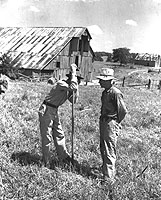 13.
1941: Harvey Lynn is name of the farmer on the left. I went to school in
a one-room school house in Farmington, Missouri with his son. I came back
ten years later to take this photograph; they knew me well and were completely
at ease even though I was holding a camera the size of a Speedgraphic.
I consider this a classic of my work, and I wouldn't take it any differently
today. MSA SC 1890-41-10,013
13.
1941: Harvey Lynn is name of the farmer on the left. I went to school in
a one-room school house in Farmington, Missouri with his son. I came back
ten years later to take this photograph; they knew me well and were completely
at ease even though I was holding a camera the size of a Speedgraphic.
I consider this a classic of my work, and I wouldn't take it any differently
today. MSA SC 1890-41-10,013
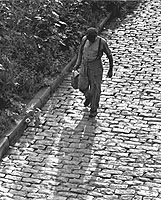 14.
1942: Wally Simmons and I used to go out on Sunday mornings looking for
things to photograph. I shot this one from the railroad trestle on the
levy in St. Louis. I thought this man walking on the cobblestones with
the cross-lighting made a nice pattern. Now I think it's a cliched subject,
but it's hard to dislike -- it's like a motherhood picture. This and the
picture of the three black boys (1) were my first pictures to hang in a
salon. MSA SC 1890-41-10,024
14.
1942: Wally Simmons and I used to go out on Sunday mornings looking for
things to photograph. I shot this one from the railroad trestle on the
levy in St. Louis. I thought this man walking on the cobblestones with
the cross-lighting made a nice pattern. Now I think it's a cliched subject,
but it's hard to dislike -- it's like a motherhood picture. This and the
picture of the three black boys (1) were my first pictures to hang in a
salon. MSA SC 1890-41-10,024
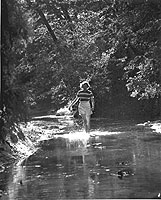 15.
1942: Tyre Blue was a stream about a mile behind our farm and Alice Wisman
was my girlfriend at the time. Even then I preferred to photograph people
in action rather than in formal poses. I like the backlighting here, and
the splash of water, and her swinging arm. Unfortunately, I overdeveloped
the negative and now it's difficult to get a good print. MSA SC 1890-41-10,017
15.
1942: Tyre Blue was a stream about a mile behind our farm and Alice Wisman
was my girlfriend at the time. Even then I preferred to photograph people
in action rather than in formal poses. I like the backlighting here, and
the splash of water, and her swinging arm. Unfortunately, I overdeveloped
the negative and now it's difficult to get a good print. MSA SC 1890-41-10,017
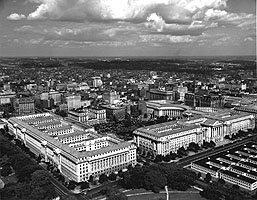 16.
Summer 1943: This is a view from the top of the Washington Monument looking
toward the northeast. I shot 360 degrees that day because it was so clear.
My wife says that if there's a high spot anywhere around, I'll get on it
to take pictures. It's sort of surprising that I was allowed to make these
pictures since it was during wartime. MSA SC 1890-30-10,037
16.
Summer 1943: This is a view from the top of the Washington Monument looking
toward the northeast. I shot 360 degrees that day because it was so clear.
My wife says that if there's a high spot anywhere around, I'll get on it
to take pictures. It's sort of surprising that I was allowed to make these
pictures since it was during wartime. MSA SC 1890-30-10,037
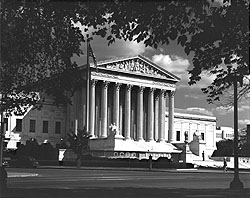 17.
1943 circa: After living in St. Louis, I really used to enjoy wandering
around Washington with my camera because there were so many dramatic buildings.
Even though it's rather dated, this view of the Supreme Court hasn't changed
much, so I still can still sell it occasionally as a stock photograph.
MSA SC 1890-30-10,204
17.
1943 circa: After living in St. Louis, I really used to enjoy wandering
around Washington with my camera because there were so many dramatic buildings.
Even though it's rather dated, this view of the Supreme Court hasn't changed
much, so I still can still sell it occasionally as a stock photograph.
MSA SC 1890-30-10,204
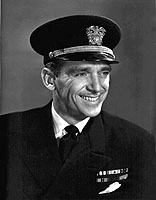 18.
1944: Although I had no formal training in portraiture until after the
war, my primary assignment in the Navy was to do portraits of celebrities,
officers, and war heroes. One of the most famous was Douglas Fairbanks,
Jr., who arrived back from active duty looking very gaunt and preoccupied.
I set up the lights and got him arranged, but he must have realized I was
a little worried because he said, "What's wrong, young man?" And I responded,
"You don't look like the Douglas Fairbanks, Jr. I know from the movies,"
with which he broke into this wonderful smile and I snapped the shutter.
It's the only time I shot an officer grinning from ear to ear. MSA SC 1890-43-10,028
18.
1944: Although I had no formal training in portraiture until after the
war, my primary assignment in the Navy was to do portraits of celebrities,
officers, and war heroes. One of the most famous was Douglas Fairbanks,
Jr., who arrived back from active duty looking very gaunt and preoccupied.
I set up the lights and got him arranged, but he must have realized I was
a little worried because he said, "What's wrong, young man?" And I responded,
"You don't look like the Douglas Fairbanks, Jr. I know from the movies,"
with which he broke into this wonderful smile and I snapped the shutter.
It's the only time I shot an officer grinning from ear to ear. MSA SC 1890-43-10,028
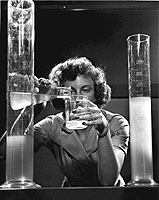 19.
1945: I was part of a crew sent out to Bethesda Naval Hospital to do a
story on WAVES who were hospital corpsmen. We didn't have any light meters,
so we had to calculate the flash exposures in our heads. I like the way
this one came out strongly backlighted, and the way only half of her eye
is showing. It adds to the intensity of the action. I used the same principle
years later when I made a series of portraits of scientists at Westinghouse.
MSA SC 1890-43-10,036
19.
1945: I was part of a crew sent out to Bethesda Naval Hospital to do a
story on WAVES who were hospital corpsmen. We didn't have any light meters,
so we had to calculate the flash exposures in our heads. I like the way
this one came out strongly backlighted, and the way only half of her eye
is showing. It adds to the intensity of the action. I used the same principle
years later when I made a series of portraits of scientists at Westinghouse.
MSA SC 1890-43-10,036
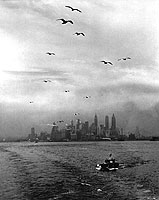 20.
November 7, 1945: I took this view of the New York skyline from the Staten
Island ferry. I was headed out to board the aircraft carrier Lake Champlain
to go to Europe so I could get in my sea duty before I left the Navy. I
couldn't have arranged the birds better, and it was fortunate to have the
launch following us to add another plane of dimension to the picture. Mary
was with me when I made this one. ["It was swell you could get aboard my
ship," he wrote to her from shipboard. "I enjoyed the day--as much as I
could knowing I was to leave you for so long."] MSA SC 1890-46-10,084
20.
November 7, 1945: I took this view of the New York skyline from the Staten
Island ferry. I was headed out to board the aircraft carrier Lake Champlain
to go to Europe so I could get in my sea duty before I left the Navy. I
couldn't have arranged the birds better, and it was fortunate to have the
launch following us to add another plane of dimension to the picture. Mary
was with me when I made this one. ["It was swell you could get aboard my
ship," he wrote to her from shipboard. "I enjoyed the day--as much as I
could knowing I was to leave you for so long."] MSA SC 1890-46-10,084
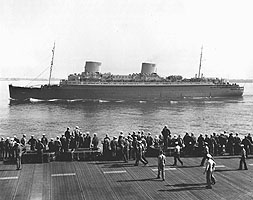 21.
November 8, 1945: As we left New York harbor, the Europa was returning
from a test run. My camera for the trip was a Rolliflex with an 80mm lens,
so I just barely was able to fit the whole ship in the picture. I was on
the admiral's bridge when I took this, which was easily accomplished since
there was no admiral on board. The purpose of the trip was to photograph
troops as they were being loaded on ships to return home after the war.
MSA SC 1890-47-10,071
21.
November 8, 1945: As we left New York harbor, the Europa was returning
from a test run. My camera for the trip was a Rolliflex with an 80mm lens,
so I just barely was able to fit the whole ship in the picture. I was on
the admiral's bridge when I took this, which was easily accomplished since
there was no admiral on board. The purpose of the trip was to photograph
troops as they were being loaded on ships to return home after the war.
MSA SC 1890-47-10,071
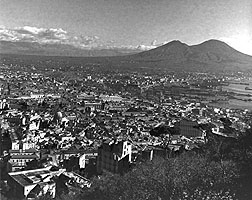 22.
November 1945: I've never printed this negative before. That's Mt.Vesuvius,
25 miles south of Naples--the first stop on our tour of Europe. ["Sunday
morn we went into town, I sent you a wire first thing and saw a few more
sights," he wrote to Mary. "I went by myself because I knew I could see
more that I wanted to see. I did. I climbed the mountain and saw the town
from above. It is a different city from above. In fact, it is a different
city on top of the mountain, much cleaner and a better class of people."]
MSA SC 1890-44-10,063
22.
November 1945: I've never printed this negative before. That's Mt.Vesuvius,
25 miles south of Naples--the first stop on our tour of Europe. ["Sunday
morn we went into town, I sent you a wire first thing and saw a few more
sights," he wrote to Mary. "I went by myself because I knew I could see
more that I wanted to see. I did. I climbed the mountain and saw the town
from above. It is a different city from above. In fact, it is a different
city on top of the mountain, much cleaner and a better class of people."]
MSA SC 1890-44-10,063
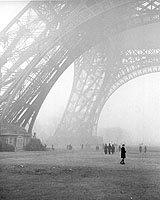 23.
November 1945: We were in Paris on Thanksgiving and the day after. It was
foggy the whole time, so I made very few photographs. I wanted to get a
shot of the Eiffel Tower but it was hopeless, so I got this view instead.
I like the way the receding planes in the fog create a mood that makes
it work. The people give a sense of scale so that you get an idea of the
whole without really seeing it. MSA SC 1890-45-10,068
23.
November 1945: We were in Paris on Thanksgiving and the day after. It was
foggy the whole time, so I made very few photographs. I wanted to get a
shot of the Eiffel Tower but it was hopeless, so I got this view instead.
I like the way the receding planes in the fog create a mood that makes
it work. The people give a sense of scale so that you get an idea of the
whole without really seeing it. MSA SC 1890-45-10,068
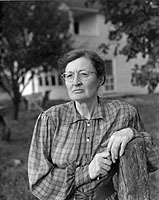 24.
1949: This was my aunt, Edna Warren. I lived with her from the time I was
twelve years old until I joined the Navy. She had a greater influence on
me than anyone, and I like to think this picture shows her for the honest,
gentle person she was. People you know best are always the hardest ones
to photograph. This portrait was made after I had my formal training at
Harris & Ewing Studios following the war. You can see how I arranged
her arms into a graceful position to give a circular effect to emphasize
her face. MSA SC 1890-47-10,200A
24.
1949: This was my aunt, Edna Warren. I lived with her from the time I was
twelve years old until I joined the Navy. She had a greater influence on
me than anyone, and I like to think this picture shows her for the honest,
gentle person she was. People you know best are always the hardest ones
to photograph. This portrait was made after I had my formal training at
Harris & Ewing Studios following the war. You can see how I arranged
her arms into a graceful position to give a circular effect to emphasize
her face. MSA SC 1890-47-10,200A
| The Eye of the Beholder | The War and Before |
| Sleepytime Annapolis | Annapolis in Blossom |
| The Chesapeake Bay | Vintage Photographs |
| Cityscape | About Maryland |
|
Tell Us What You Think About the Maryland State Archives Website!
|